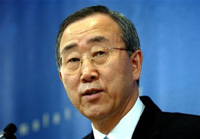Ban Ki-moon promises to bring peace to Middle East as 8th UN Secretary General
South Korea's Ban Ki-moon laid out an ambitious agenda after taking the oath of office as the United Nations' eighth secretary-general, promising to become personally engaged in efforts to bring peace to the Mideast and Darfur and to restore the world body's reputation amid corruption scandals.

The 62-year-old career diplomat, who will take the reins of the world body on Jan. 1 when Kofi Annan steps down after 10 years, said he plans take "concerted action" to achieve U.N. development goals that include cutting extreme poverty by half and universal education by 2015.
Calling himself "a harmonizer and a bridge-builder," Ban said he also wants to repair relations between the U.N.'s rich and poor member states who fought bitterly over parts of Annan's reform program, and building a staff that is mobile, dynamic, accountable and better able to meet the challenges of the 21st century.
"You could say that I'm a man on a mission, and my mission could be dubbed Operation Restore Trust - trust in the organization and trust between member states and the Secretariat," he said.
"I hope this mission is not mission impossible," he told reporters who burst into laughter.
Ban also showed his sense of humor at the start of his press conference after Thursday's swearing-in ceremony, noting that the media in South Korea dubbed him "the slippery eel because I was too charming for them to be able to catch me." He said the nickname was given to him "because I was very friendly with the media ... but I promise today that I can be a pretty straight shooter when I need to."
In his sharpest comments, Ban said Iran's call for Israel's destruction and its dismissal of the Nazi Holocaust were "unacceptable" - and he called on all countries to respect "both in rhetoric and practice" that it is not acceptable to call for the elimination of any state or people.
Ban also expressed concern about the regional and global implications of Tehran's nuclear program and urged the Iranian government to engage in negotiations with the six parties that offered a package of incentives if it suspends uranium enrichment.
As South Korea's foreign minister, Ban was deeply involved in the six-nation effort to persuade North Korea to give up its nuclear weapons program. He said he will be watching the talks, which resume Dec. 18 in Beijing, and think about initiatives he can take as secretary-general.
Ban also said he planned to become "directly engaged" in efforts to bring peace to Sudan's Darfur region, adding his first trip may be to an African Union summit in late January. The AU provides the peacekeeping force in Darfur which has been unable to quell nearly four years of violence that has left more than 200,000 people dead and created a massive humanitarian crisis.
"The suffering of the people of Darfur is simply unacceptable, and despite intensiveefforts, the security situation appears to be deteriorating over recent days," he said.
Ban singled out Middle East peace as a priority and said he will try "to energize" an Israeli-Palestinian peace plan drafted by the so-called Quartet of Mideast peacemakers - the United Nations, the European Union, Russia and the U.S. He also expressed concern about the deteriorating situations in Lebanon and Iraq, as well as conflicts in Africa.
The General Assembly first paid tribute to Annan, approving a resolution by acclamation lauding Annan's "many bold initiatives" to reduce poverty, promote peace, protect the environment and launch the U.N. reform process. The assembly then gave him a standing ovation.
Then, Ban was escorted to the podium where he raised his right hand and put his left hand on the U.N. Charter - a special request he made - to take the oath administered by General Assembly President Sheikha Haya Rashed Al Khalifa.
He swore to conduct himself solely in the interests of the United Nations, and refuse to accept instructions from any government or other authority.
Ban will be the first Asian to lead the United Nations in 35 years. His selection is also a milestone for South Korea, which joined the United Nations only in 1991 and still has U.N. troops on the tense border with North Korea.
Ban defeated six other candidates vying to be the U.N. chief and was first selected by the Security Council and then approved by the General Assembly in October.
On Thursday, he said he would prefer a woman for deputy secretary-general and was looking at several names, which he did not disclose.
Ban will oversee an organization with some 92,000 peacekeepers around the world and a US$5 billion (EUR 3.8 billion) annual budget. The U.N.'s reputation has been battered by scandals in the US$64 million Iraq oil-for-food program and in peacekeeping procurement. Its outdated practices need reform to tackle this century's problems.
In a brief address after being sworn in, Ban pledged "to set the highest ethical standard" and work to restore trust in the organization.
"The good name of the United Nations is one of its most valuable assets - but also one of its most vulnerable," Ban said.
Ban distanced himself from Annan's farewell address on Monday in which the secretary-general criticized the global leadership of U.S. President George W. Bush's administration. Annan called on America not to sacrifice its democratic ideals while waging war and to work with other countries, the AP reports.
"That I think, was his own personal assessment and insight, which he gained during his tenure," Ban said.
He stressed that the U.S. was an important U.N. member and said he would personally work to resolve differences of opinion between Washington and the world body and ensure constructive U.S. participation in all U.N. activities.
Subscribe to Pravda.Ru Telegram channel, Facebook, RSS!


